End of the rainbow: How Turkey is lagging behind on LGBTQ+ rights
What happens when an ever more visible LGBTQ+ community of activists and creatives comes up against an ever more repressive regime? For refugees in Turkey, queer or trans, life is becoming increasingly similar to the reality they chose to flee from in their homeland. Debbie Luxon reports
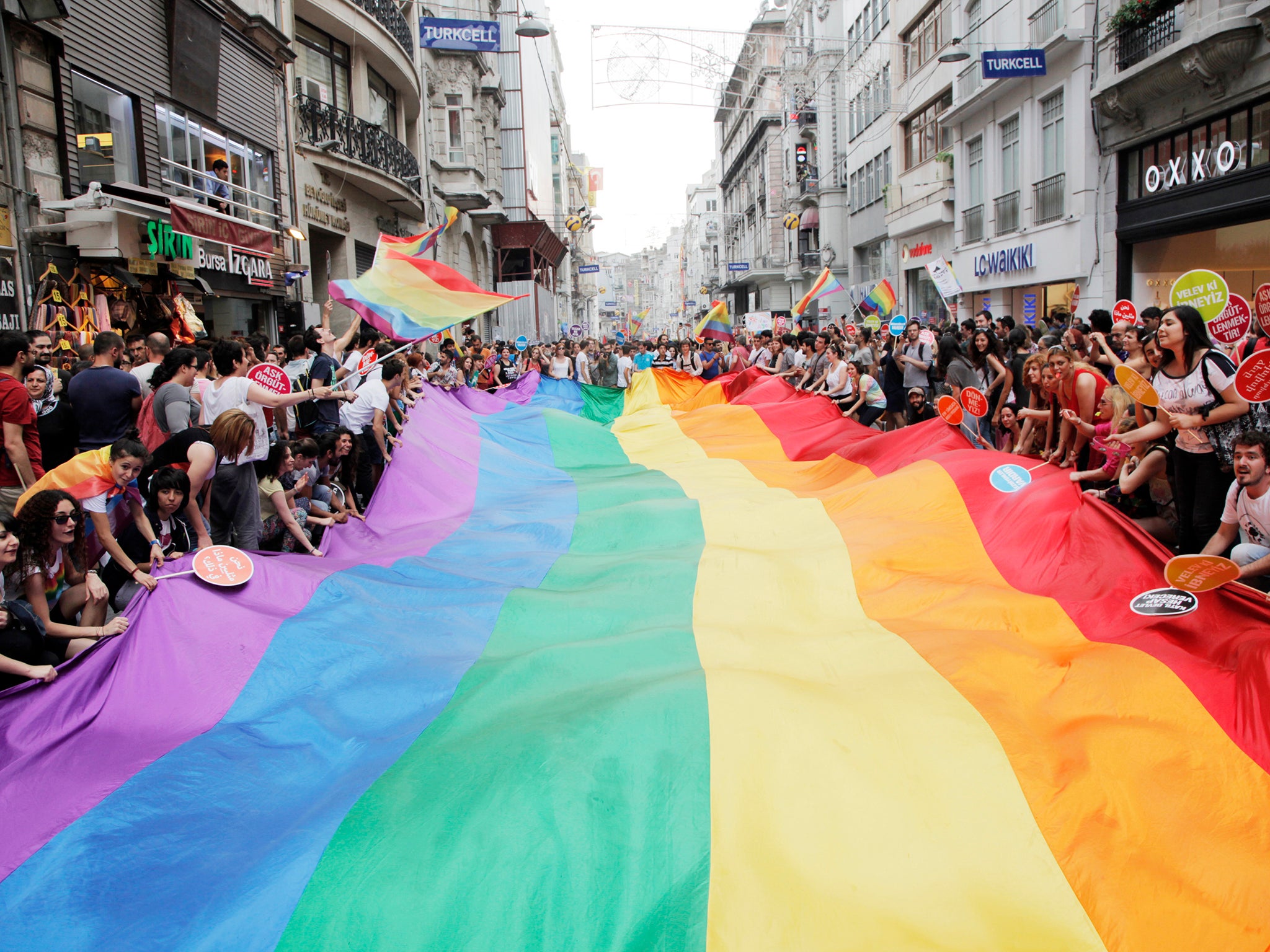
The 2003 LGBTQ+ Pride march in Istanbul had roughly 20 people attend. People walked alongside the march on the pavements with sunglasses so they couldn’t be recognised. In 2014, 100,000 people took part – but that year, the marchers were met with tear gas and rubber bullets.
Istanbul is the queer capital of Turkey, and queer rights, like politics more widely, have had huge peaks and troughs there over the last 30 years.
The recent degradation of rights started in 2013 with the Gezi Park protests ending in police rioting. An attempted coup in 2016 left the country in a self-declared state of emergency lasting two years. Since then it has become harder to operate legitimately as anything that could be labelled anti-government, which effectively bars any form of “protest” including Pride. In some Turkish communities LGBTQ+ people are still seen to corrupt society.
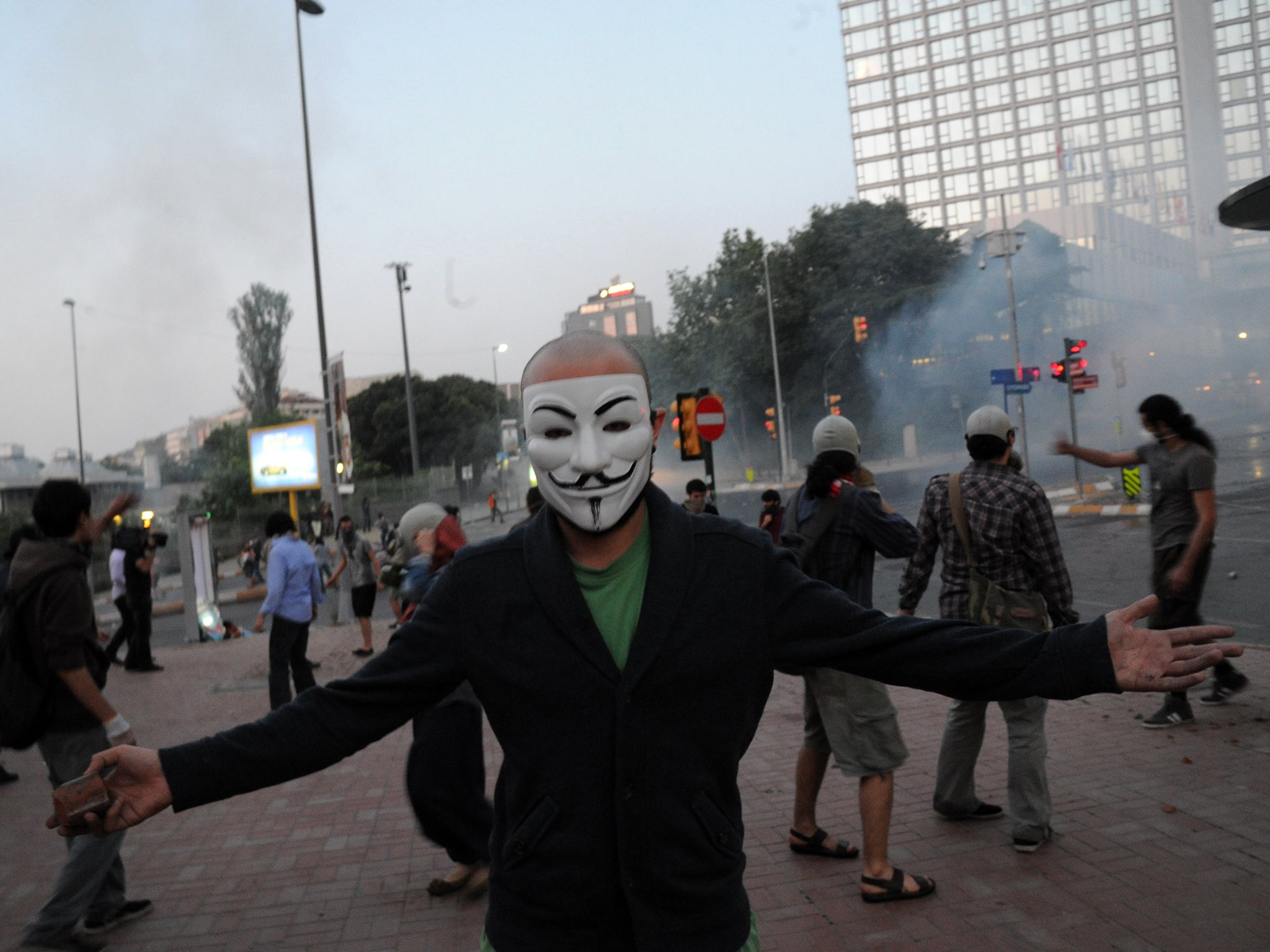
This climate comes with the stark contrast of the LGBTQ+ community being more visible than ever. With repressive laws and “unspoken rules” quashing everything from Pride marches to queer flags, and the capital city Ankara under queer shutdown, how is this community surviving, manifesting, and even thriving in this confusing and chaotic landscape?
One person there for every march was Öner Ceylan, self-proclaimed “dinosaur” of the Turkish queer activist movement. He has worked for the LGBTQ+ activist group Lambdaistanbul, the group responsible for Pride, for 21 years. Attending one of their weekly meetings in 1997, it was the first time he had met other queer people, at age 26. “I was terrified. I visually judged them as freaks,” he says.
He says people still come to Lambda for the first time. “It seems small. It really is not. It transforms lives.”
In the 2014 march, Ceylan came over as part of a crowd on a boat from the Asian side of Istanbul, a sprawling city divided by the Bosphorus strait. “It was like a Pride boat, chanting, joyful, flags in the air. We were supposed to arrive in one port but the police blocked us so we moved to another. We were welcomed with tear gas and rubber bullets… It was impossible. It was a complete war.”
Unspoken rules
Lambdaistanbul, which has been campaigning for more than 25 years, lost its permanent office in 2016 due to rent and funding issues. Landlords would hang up once they learned what the group was, rent was high on the places it was accepted to and shared offices were a safety issue, so people stopped attending. In 2010 the group was almost shut down by the government for having a foreign name – a law thought to target Kurdish culture. KAOS GL, a huge Ankara-based LGBTQ+ organisation, was subjected to similar threats. Reduction in volunteers due to the political climate meant that Lambdaistanbul’s huge capacity – which incorporated daily events, organising Pride, a hotline, meetings with parliament and helping write bills – has reduced to once a week meet-ups organised by a group chat. “It’s hard to pinpoint how it happened,” says Ceylan.
In the capital city of Ankara it is more aggressive. A blanket ban on LGBTQ+ activities has been in effect since November 2017. University groups are leading the radical front against this ban. The Middle East Technical University LGBTQ+ group organised a film screening during which authorities cut the power, their rainbow flags are banned on campus, and during a graduation ceremony, a guard attacked one student and another was detained for holding the flags.
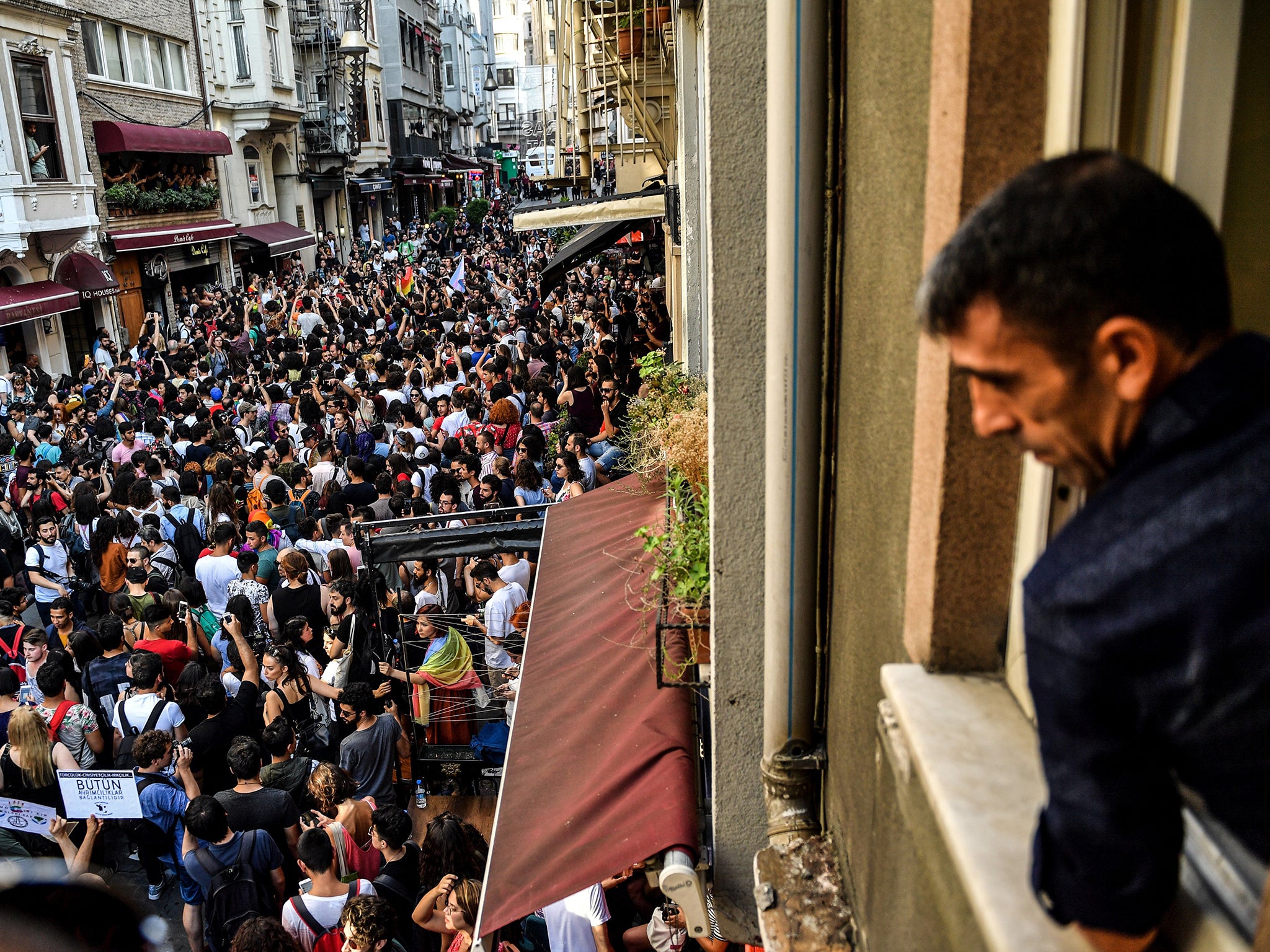
Some groups, however, are growing. A group called Cinsel Şiddetle Mücadele Derneği (Association for the Struggle against Sexual Violence) is blossoming in this repressive landscape, going from a volunteer-run organisation to an internationally funded five-strong team in just four years. Its education-focused campaign sees it training media to be more inclusive, and to address victim blaming and rape culture. In schools, its workshops examine everything from sexuality and consent to digital and emotional violence. They even took a football event to court for showing rape imitations and songs glorifying rape on screen. The group have met criticism – not least from the neighbours protesting their use of the word “cinsel” (sexual) on the doorbell – but, according to group member Nurgül Öztürk. it is driven by a belief in its work: “We are not only protesting, we produce support.”
Trans lives and violence
For transgender people in Turkey, the prospects are worse, with transgender murder being the highest in Europe – 44 murders since 2008, according to umbrella organisation Transgender Europe. Suicide rates are not far behind, and verbal and physical assault remains prevalent.
The abusive treatment of transgender people in prison provoked a hunger strike by activist Kıvılcım Arat. Transgender and Kurdish, she grew up in a politicised and unionised shantytown around the industrial part of Istanbul. She helped publicise the cause of imprisoned trans woman Diren Coskun, and the torture she experienced, through joining her in hunger strike in February of last year, forcing the government to meet Coskun’s demands. Arat has been a powerhouse of queer diplomacy, acting as a bridge connecting LGBTQ+ movements to parliament on issues such as housing, visibility and violence.
But Arat recently quit her campaigning due to the continual erasure of transgender people in governmental roles, despite the first queer men running openly in the 2013 midterms. She is now out of a job without the use of English, her degree belonging to a name that is no longer hers. She’s been so vocal that even NGOs won’t risk having her name on the payroll; she calls this a “social death”. The hunger strike exacerbated a long-term illness she harbours, and she still faces the physical attacks all transgender people are at risk of in Turkey. In September she was shot at in her back garden, and then arrested after being accused of sexually assaulting the assailants’ son.
When she has no other options she turns to sex work. In March she was attacked with a knife, and her money stolen by a client. After the assaults, and the political climate telling her she is more and more at risk of detention, she has decided to leave Istanbul, but passports are expensive. “There’s a stage of being emotionless. I can’t read my emotions… I don’t have time for that right now,” she says.
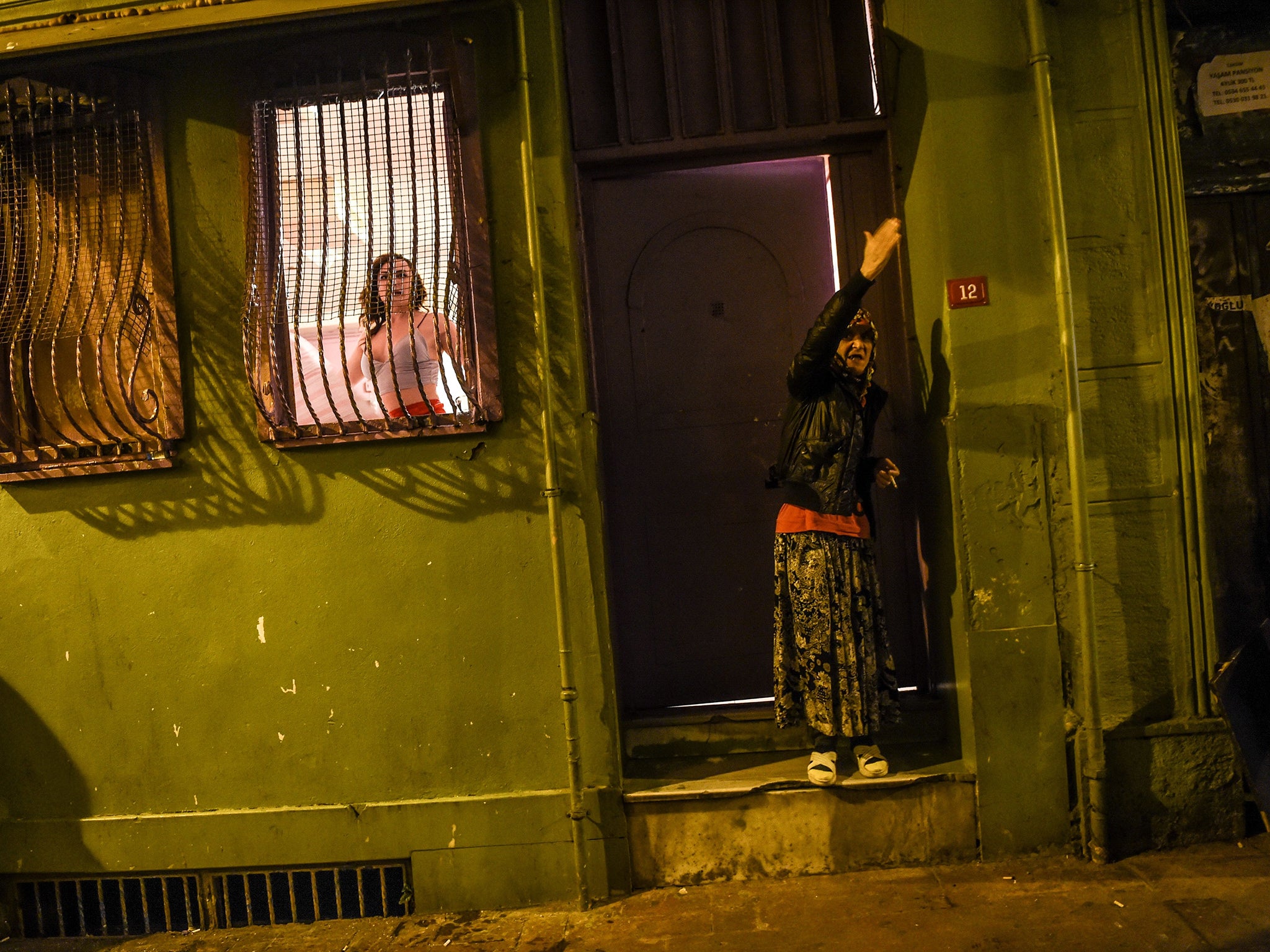
Literature on transgenderism was first translated into Turkish by a transgender man called Aligül, who was therefore tasked with literally defining the language used in Turkish around transgender identity. He founded Voltrans, the first ever transactivist group in Turkey. Together the group created a manifesto to stop trans pathologisation – the treatment of trans identities as “mental health disorders” – demanding the end to forced therapy, operations and degrading psychiatric questioning. As with many of these groups, Voltrans lost momentum, but still holds birthday events each year for Aligül, who died of ovarian cancer in 2013. “Voltrans will continue until we don’t need to continue anymore,” Aligül had vowed.
‘It’s as bad as Iran now’
For transgender refugees, the prospects are worse still. Shaya Goldoust, a transgender Iranian woman and internet educator, has been a refugee in Turkey for three years, having fled the aggression LGBTQ+ communities face in Iran. She had planned to leave Turkey for the US, but the Trump agenda turned a border that prioritised LGBTQ+ refugee applications into a wall. Stuck in Turkey, Shaya has been unable to complete her gender reassignment surgery, as the procedure requirements in Turkey involve intrusive medical examinations and patronising questionnaires to determine gender. “We feel like we are being sexually assaulted every day by the intrusion of the authorities”. Without the surgery, the Turkish government won't change her gender on her ID.
Transgender refugees have been know to take their Hormone Replacement Therapy into their own hands, without medical oversight. This situation, exacerbated by lack of income, means refugees turn to working illegally in textile factories, cafes, restaurants. Sex work is often the only choice for transgender people in Turkey who are either unable to work due to refugee status or shunned by society due to their identity. Being caught working as a refugee means jail or deportation.
For Iranian refugees, queer or trans, life is becoming increasingly similar to the reality they chose to flee from in their homeland.
The Pride march in Istanbul is still attempted every year, many injuries being sustained as a result. Mohammed Ali Khosravi, otherwise known as Makhi, is a queer Iranian artist, now refugee, who works around self-portraits. He says they became darker when arriving in Turkey four years ago. Displaying his artwork at the 2018 Istanbul Pride week meant needing authorisation from police to leave his satellite city Denizli, one of the many rural places refugees are sent to.
Ironically, his first ever exhibition, due to Iranian censorship, was in Denizli, which was greeted by utter miscomprehension by the locals. “In the capital of Iran the queer knowledge is greater than in Denizli,” says Makhi. “But in Istanbul there is Pride. There are clubs. Denizli is a limbo.”
Despite the dangers, Istanbul acts as a vital safe space to some. Makhi is nervous about starting collaborations in Turkey, as he doesn’t know when he will leave. “I try to make myself comfortable – but I don’t know when I’m leaving. I can’t buy a pillow, or glass.” To avoid drawing attention to himself he is not open about his sexuality in Denizli: “My hair is long, so to counter this I grow my beard so people don’t suspect I’m gay.” The refugee community there as a whole suffers from depression. “I knew three who committed suicide since I arrived,” he says. “The queer artists network is small, I can name the queer artists in Istanbul for you now.”
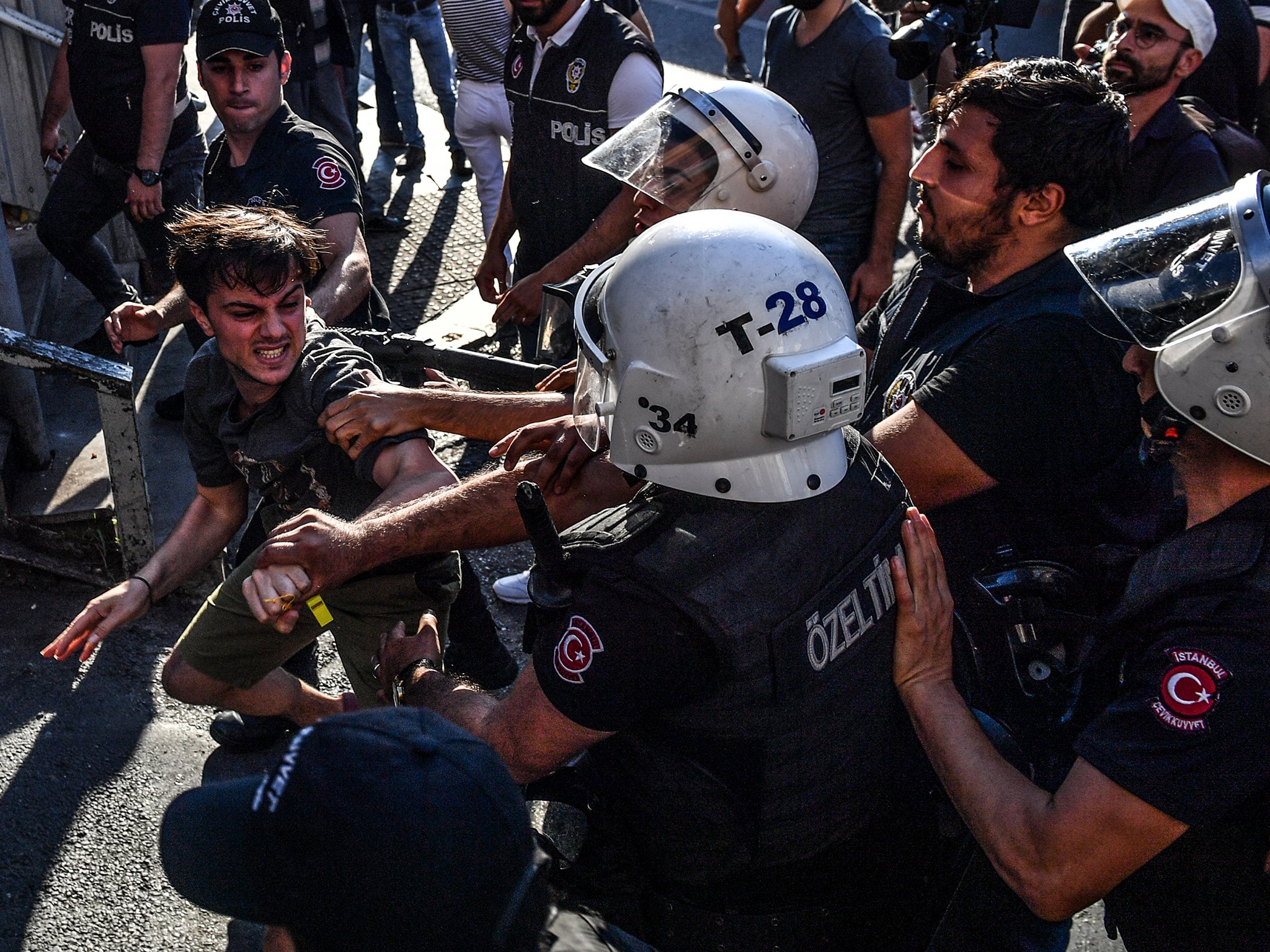
Nevertheless, Istanbul has a close-knit network of artists and activists who help each other’s respective work. Ozan Unlukoc, a queer artist, says: “You have to be an activist to make queer art. You can’t be anti-political. That’s reality.”
The biggest issue is funding, according to art critic Kültigin Akbulut. “It has reduced specifically for marginal artists and those who are against the government, as most are,” he says. His perspective on the censorship crackdown describes a cascade effect that began with cinema that was not approved of, then literature, and it has now moved to art. “Collectors don’t want progressive queer art,” says Akbulut. The works that eventually gets displayed are “softened” versions of queerness.
The Istanbul Modern art gallery MOMA owns powerful work by queer artist Taner Ceylan that is archived. Turkey has a quiet history of queer culture in art that Akbulut is only too happy to make louder, from erotic Ottoman miniatures, re-emerging as Fifties photos of queer couples and blossoming into the public sphere in the Eighties as feminism, protest, and an awaited exploration of desire. “Creatives are free here but stay safe,” Akbulut say. Police only care about them being visible.
Art in all forms, from painting to drag, still exists in Istanbul, so long as it is not on the streets. As Unlukoc puts it, “the repression is in cultural visibility”. Despite art collectives like Unlukoc’s and the community itself knowing each other like a sprawling family, you have to wonder how ultimately damaging this censorship is to the artists, art trade and the community as a whole.
“After the coup, everything changed. There is a huge oppression,” says Kıvılcım Arat. “It is total erasure of the movement. It’s stopping all visibility in public space. Activists also feel so threatened that people are not active anymore. We are trying to find new ways to exist. Openly political organisations can no longer operate.”
In the late-Noughties Istanbul, recalls the now London-based queer activist and writer Ceylan Begüm Yıldız, “there was a street where you knew everybody. One building was the Lambda centre, across the road from a Kurdish feminist group, and on the corner was the human rights association space full of ‘leftist revolutionaries’.”
They all know each other, they can name who is here and who has left, who can’t leave. Queer bars in Istanbul are there and are open, for drag and talks and parties. You just can’t be on the streets. It’s a quiet repression.
Until the tear gas starts again, at least.
Join our commenting forum
Join thought-provoking conversations, follow other Independent readers and see their replies
Comments